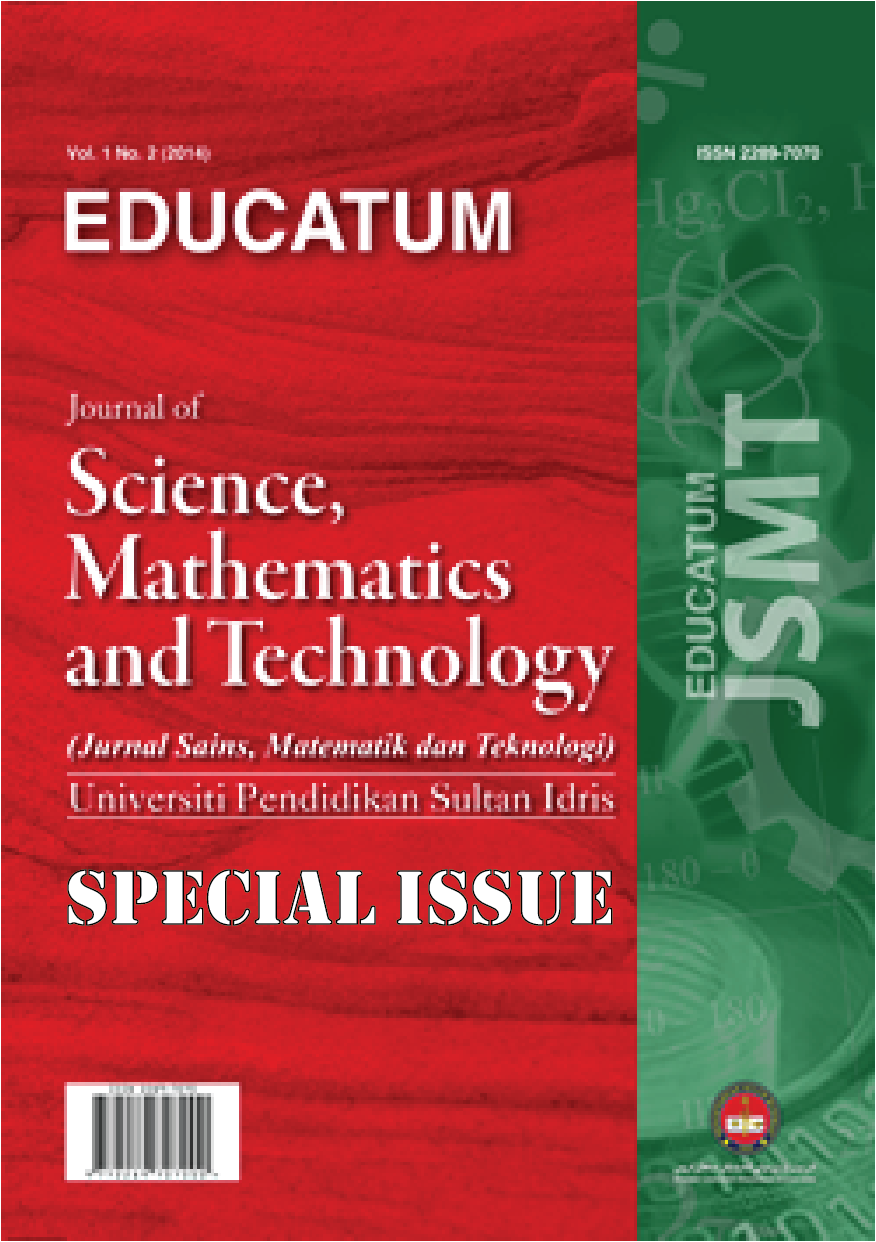Teachers’s practices in teaching and learning algebraic problem solving
DOI:
https://doi.org/10.37134/ejsmt.vol9.sp.1.2022Keywords:
Algebraic problem solving, problem posing strategyAbstract
Algebraic problem solving is one of the important areas in learning mathematics. However, the result shows that student’s performance in algebra mainly in solving problem is not satisfying. This study had two folds aim that are capturing teacher’s view on the teaching and learning algebraic problem solving and also to grasp the idea whether the teacher have implicitly implemented problem posing strategy in a classroom. Thus, the objectives of this study are 1) to gain teacher practices in teaching and learning algebraic problem solving, 2) to find out the difficulties faced by teachers while teaching Form Two students to solve algebraic problem solving, and 3) to find out whether the teachers have implicitly imposed problem posing strategy in a classroom. Participants in the study were 8 experienced teachers who were been teaching mathematics especially mathematics Form Two syllabus and have teaching experience for more than five years. Data were gathered through qualitative technique that is using semi structured interview. Results from the study showed that teachers are still using teachers’ centered approach in teaching and learning algebraic problem solving, the difficulty faced by the teachers in teaching algebraic problem solving is students lack of mathematics skills, and teachers rarely used problem posing strategy in a classroom. This study provides an overview that teacher should implement new strategy in teaching problem solving algebra in order to increase student’s performance. One of the promising strategies is known as problem posing strategy.
Downloads
References
Usiskin, Z. (1995). Why is Algebra Important To Learn? American Educator. 30–37.
Mazlini, A., & Nurul Sarah, J. (2016). Keupayaan murid cemerlang akademik tingkatan empat dalam menyelesaikan masalah algebra bukan rutin. Jurnal Pendidikan Sains & Matematik Malaysia, 6(1), 58–67.
Makonye, J. P., & Matuku, O. (2016). Exploring Learner Errors in Solving Quadratic Equations. International Journal of Educational Sciences, 12(1), 7–15. https://doi.org/10.1080/09751122.2016.11890407
Sidika Nihan Er. (2017). Mathematics readiness of first-year college students and missing necessary skills: perspectives of mathematics faculty. Journal of Further and Higher Education, 9486(August), 1–16. https://doi.org/10.1080/0309877X.2017.1332354
Deringöl, Y. (2019). Misconceptions of primary school students about the subject of fractions: views of primary teachers and primary pre-service teachers. International Journal of Evaluation and Research in Education (IJERE), 8(1), 29. https://doi.org/10.11591/ijere.v8i1.16290
NCTM, 2000. Principles ans Standards for School Mathematics. 3rd Edn. National Council of Teachers of Mathematics, Reston, VA., ISBN-13: 9780873534802, Pages: 402.
Kementerian Pendidikan Malaysia. (2016). Buku Penerangan Kurikulum Standard Sekolah Menengah (KSSM). Bahagian Pembangunan Kurikulum.
Norfadhilah Zalina, M. Z., & Najihah, A. W. (2017). Cabaran dalam Pengajaran Matematik Kurikulum Standard Sekolah Menengah (KSSM). Proceeding of International of Empowering Civilization, 2025, 7–8.
Silver, E. A. (1994). On mathematical problem posing. For the Learning of Mathematics, 14(1), 19-28.
Kementerian Pendidikan Malaysia (2020). Laporan Kebangsaan TIMSS 2019. Trends in International Mathematics and Science Study. Bahagian Perancangan Dan Penyelidikan Dasar Pendidikan Kementerian Pendidikan Malaysia.
OECD (2014). PISA 2012 Creative Problem Solving: Students’ Skills In Tackling Real-Life Problems (Vol. 5). PISA. OECD publishing. DOI: http://dx.doi.org/10.1787/9789264208070-en
Brown, S. I., & Walter, M. I. (1983). The art of problem posing. Philadelphia, PA: Franklin Institute Press
Cazzola, M. (2008). Problem-based learning and Mathematics: Possible Synergical Actions. In Proceeding, IATED (In- ternational Association of Technology, Education and Development), Valencia, Spain, 2008.
Akben, N. (2018). Effects of the Problem-Posing Approach on Students’ Problem Solving Skills and Metacognitive Awareness in Science Education. Research in Science Education, 1–23. https://doi.org/10.1007/s11165-018-9726-7
Darhim, Sufyani Prabawanto, & Bambang Eko Susilo. (2020). The effect of problem-based learning and mathematical problem posing in improving student’s critical thinking skills. International Journal of Instruction, 13(4), 103–116. https://doi.org/10.29333/iji.2020.1347a
Asri Dwita, & Sugiman. (2020). Improving Problem-Solving Ability Through Problem-Posing Model in Mathematics. Advances in Social Science, Education and Humanities Research, 491, 320–324. https://doi.org/10.2991/assehr.k.201201.057
Hsiao, J. Y., Hung, C. L., Lan, Y. F., & Jeng, Y. C. (2013). Integrating worked examples into problem posing in a web-based learning environment. Turkish Online Journal of Educational Technology, 12(2), 166-176.
Kojima, K., Miwa, K., & Matsui, T. (2015). Experimental study of learning support through examples in mathematical problem posing. Research and Practice in Technology Enhanced Learning, 10(1). https://doi.org/10.1007/s41039-015-0001-5
Abdolreza, L., Aida Suraya, M. Y., & Kamariah, B. A. B. (2017). Comparison of New Mathematics Teaching Methods With Traditional Method. PEOPLE: International Journal of Social Sciences, 3(2), 1285–1297. https://doi.org/10.20319/pijss.2017.32.12851297
Akbari, R., & Yazdanmehr, E. (2014). A critical analysis of the selection criteria of expert teachers in ELT. Theory and Practice in Language Studies, 4(8), 1653–1658
Nor’ain Mohd Tajudin, Marzita Puteh, Mazlini Adnan, Mohd Faizal Nizam Lee Abdullah, Amalina Ibrahim. (2017). Algebraic Problem Solving: Teacher’s Practices Towards Teaching and Learning. Journal of Engineering and Applied Sciences, 12(13), 3489–3494
Star, J. R. & Newton, K. J. (2009). The nature and development of experts’ strategy flexibility for solving equations. ZDM, 41, 557-567
Cai, J., & Nie, B. (2007). Problem solving in Chinese mathematics education: Research and practice. ZDM - International Journal on Mathematics Education, 39(5–6), 459–473. https://doi.org/10.1007/s11858-007-0042-3
Afrilianto, M., Sabandar, J., & Wahyudin. (2019). Improving Students’ Mathematical Problem Posing Ability Using PACE Model. Journal of Physics: Conference Series, 1315(1). https://doi.org/10.1088/1742-6596/1315/1/012007
Hackman, D. G. (2004). Constructivism and block scheduling: Making the connection. Phi Delta Kappan, 85(9): 697-702. https://doi.org/10.1177/003172170408500911





